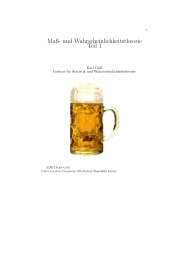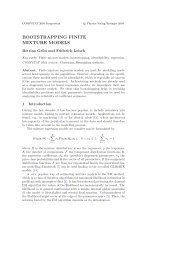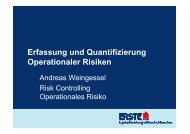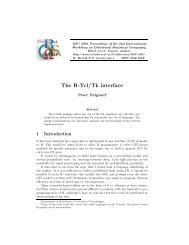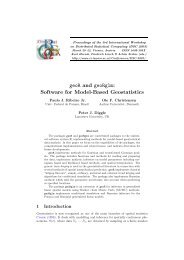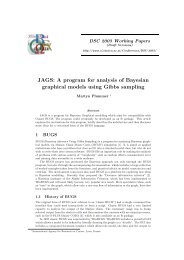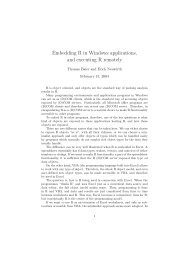R-WinEdt - The R Project for Statistical Computing
R-WinEdt - The R Project for Statistical Computing
R-WinEdt - The R Project for Statistical Computing
Create successful ePaper yourself
Turn your PDF publications into a flip-book with our unique Google optimized e-Paper software.
Proceedings of the 3rd International Workshop<br />
on Distributed <strong>Statistical</strong> <strong>Computing</strong> (DSC 2003)<br />
March 20–22, Vienna, Austria ISSN 1609-395X<br />
Kurt Hornik, Friedrich Leisch & Achim Zeileis (eds.)<br />
http://www.ci.tuwien.ac.at/Conferences/DSC-2003/<br />
R-<strong>WinEdt</strong><br />
Uwe Ligges<br />
Abstract<br />
In the first part of this paper the status quo of R-<strong>WinEdt</strong>, a plug-in <strong>for</strong> the<br />
shareware editor <strong>WinEdt</strong> <strong>for</strong> Windows, is described. This description includes<br />
the interface between R and <strong>WinEdt</strong>, convenient editing features like syntax<br />
highlighting, and the installation procedure. <strong>The</strong> second part is aimed at<br />
the future of R-<strong>WinEdt</strong>. Is it desirable to improve the plug-in? Possible<br />
improvements related to the interface, and integration of Sweave functionality<br />
are discussed.<br />
1 Introduction<br />
R-<strong>WinEdt</strong> 1 is a plug-in <strong>for</strong> <strong>WinEdt</strong> 2 , a shareware editor <strong>for</strong> the operating system<br />
Windows 3 . It provides an “interface” to R (Ihaka and Gentleman, 1996), a statistical<br />
programming language and environment. Additionally, a highlighting scheme,<br />
which illuminates the syntactical structure of the R code, replaces <strong>WinEdt</strong>’s defaults.<br />
Shortcuts, menus, and toolbar buttons are included to provide easy access<br />
to common operations <strong>for</strong> the user’s convenience. <strong>The</strong> existing functionality will be<br />
presented in Section 3, just after some comments why <strong>WinEdt</strong> is the editor of my<br />
choice in Section 2.<br />
Section 4 is aimed at the future of R-<strong>WinEdt</strong>. Its “interface” to R will be discussed,<br />
as well as possible changes and improvements. Further on, it will be discussed<br />
whether it is desirable to have full support of Sweave (Leisch, 2002), which<br />
provides convenient state of the art literate statistical analysis with R.<br />
2 Why <strong>WinEdt</strong>?<br />
<strong>The</strong> recommended editor <strong>for</strong> writing R code is the Emacs (Stallmann, 1999) with<br />
its ESS interface (Emacs Speaks Statistics; Rossini, Heiberger, Sparapani, Mächler,<br />
1 http://CRAN.R-<strong>Project</strong>.org/contrib/extra/winedt/<br />
2 http://www.<strong>WinEdt</strong>.com/<br />
3 Windows is a trademark of the Microsoft Corporation.
Proceedings of DSC 2003 2<br />
Figure 1: <strong>WinEdt</strong> in its “regular” L A TEX mode.<br />
and Hornik, 2003). In the R manuals, there is a remark on ESS in Venables, Smith,<br />
and the R Development Core Team (2003), and an entire Section devoted to “R<br />
and Emacs” can be found in Hornik (2003). In my experience, many Windows users<br />
feel uncom<strong>for</strong>table 4 with the Emacs. This was indeed the initial occasion <strong>for</strong> writing<br />
R-<strong>WinEdt</strong>.<br />
<strong>WinEdt</strong> is a very powerful and flexible editor focused on L A TEX, and it is widely<br />
known among L A TEX users under Windows (see Figure 1 <strong>for</strong> a screenshot). It is<br />
easy to define Task Bars, Menus, and quite sophisticated highlighting schemes in<br />
<strong>WinEdt</strong>. <strong>The</strong> editor also provides an extended Macro language that includes, e.g.,<br />
capabilities <strong>for</strong> interaction with the operating system. <strong>The</strong>re are convenient ways<br />
to automate tasks in <strong>WinEdt</strong> using this macro language (the Linux user typically<br />
uses a Makefile, instead). For details I refer to the <strong>WinEdt</strong> manuals.<br />
Because of all these features, it was easy to implement the simple plug-in in<br />
its current version. Un<strong>for</strong>tunately, <strong>WinEdt</strong> is a commercial (af<strong>for</strong>dable) shareware<br />
editor, hence I have no access to its sources. So it is necessary to convince <strong>WinEdt</strong>’s<br />
author, Aleksander Simonic 5 , in order to get desirable new features into the editor.<br />
3 Status quo<br />
<strong>The</strong> most easiest way to get to know the current state of R-<strong>WinEdt</strong> is to try it out<br />
and play around. Nevertheless, in this Section R-<strong>WinEdt</strong>’s status quo and some<br />
corresponding technicalities will be described. See Figure 2 <strong>for</strong> a screenshot of<br />
R-<strong>WinEdt</strong> in action.<br />
4 At the time of writing this article, John Fox is working on some “Windows like features” <strong>for</strong><br />
ESS. For details see http://www.socsci.mcmaster.ca/jfox/Books/Companion/ESS/.<br />
5 alex@winedt.com
Proceedings of DSC 2003 3<br />
Figure 2: <strong>WinEdt</strong> running with the R-<strong>WinEdt</strong> plug-in<br />
<strong>The</strong> recent version (1.5-0, at the time of writing) of R-<strong>WinEdt</strong> works with <strong>WinEdt</strong><br />
5.2 and later on any 32-bit version of Windows and requires R-1.2.0 or later. Of<br />
course, any version numbers are subject to change. In its most recent version, R-<br />
<strong>WinEdt</strong> is shipped in <strong>for</strong>m of a binary package <strong>for</strong> R <strong>for</strong> Windows, which requires<br />
(<strong>for</strong> an automatical installation procedure) Duncan Temple Lang’s SWinRegistry<br />
package of “<strong>The</strong> Omega <strong>Project</strong> <strong>for</strong> <strong>Statistical</strong> <strong>Computing</strong>” 6 in order to per<strong>for</strong>m<br />
required tasks related to the Windows registry.<br />
I received quite a lot questions related to the <strong>for</strong>mer (but still available) manual<br />
installation procedure of R-<strong>WinEdt</strong>, which indeed was uncommon in a way, because<br />
there was just a simple file install.bat that had to be invoked in the exactly<br />
correct directory.<br />
For detailed installation instructions see R-<strong>WinEdt</strong>’s (edited) ReadMe.txt file in<br />
the Appendix.<br />
3.1 Interface<br />
“Interface” is a Section title which implies more than what has been implemented.<br />
On the one hand, un<strong>for</strong>tunately, <strong>WinEdt</strong> does not support dcom 7 , but uses dde 8<br />
instead. I was not able to convince <strong>WinEdt</strong>’s author to implement dcom support<br />
in <strong>WinEdt</strong>. On the other hand, there is a dcom server (Neuwirth and Baier, 2001)<br />
<strong>for</strong> R available, but no dde interface.<br />
6 http://www.Omegahat.org/<br />
7 dcom: Distributed Component Object Model<br />
8 dde: Dynamic Data Exchange, basic technology of Microsoft’s ole (Object Linking and Embedding).
Proceedings of DSC 2003 4<br />
What I did instead is making use of some features of <strong>WinEdt</strong>’s macro language in<br />
the following manner. When any in<strong>for</strong>mation has to be send to R, it is constructed<br />
by the macro language. <strong>The</strong>n it is copied to the Windows clipboard and pasted into<br />
the R Console window of RGui using the following macro, which implements the<br />
awkward main part of the interface:<br />
SetFocus("RGui");<br />
// set focus to R<br />
PostMessage("RGui", $0104, $12, $20000001); // press ALT<br />
Wait(150);<br />
// RGui needs some time<br />
PostMessage("RGui", $0105, $12, $20000001); // release ALT<br />
PostMessage("RGui", $0102, 87, 1);<br />
// Char: W -> Win. Menu<br />
PostMessage("RGui", $0102, 49, 1);<br />
// Char: 1 -> Window1<br />
// = R Console<br />
Wait(150);<br />
// RGui needs some time<br />
PostMessage("RGui", $0104, $12, $20000001); // press ALT<br />
PostMessage("RGui", $0105, $12, $20000001); // release ALT<br />
PostMessage("RGui", $0102, 69, 1);<br />
// Char: E -> Edit Menu<br />
PostMessage("RGui", $0102, 80, 1);<br />
// Char: P -> Paste<br />
So this main part can be described as follows. After the focus of programs is<br />
switched from <strong>WinEdt</strong> to R (and both applications have been started, of course),<br />
key presses are simulated in a manner like one would use the menu without any<br />
mouse:<br />
1. Press Alt.<br />
2. RGui (and Windows) needs some time to open the menu, (time depends of the<br />
operating system, it takes most time on Windows XP).<br />
3. Release Alt.<br />
4. Press W – opens the menu called Windows.<br />
5. Press 1 – selects “window 1” which is identical to the R Console; now we are<br />
sure to have focussed the R Console (instead of, e.g., an R Graphics window).<br />
6. Again, some time is needed to switch to the R Console window.<br />
7. Press and release Alt to open the menu again.<br />
8. Press E to open the Edit menu, and<br />
9. press P to Paste the contents of the clipboard into the R Console window.<br />
This macro code is written <strong>for</strong> working with RGui running in --mdi mode, a version<br />
working with RGui’s --sdi mode is somewhat simpler:<br />
SetFocus("R Console");<br />
Wait(150);<br />
PostMessage("R Console", $0104, $12, $20000001);<br />
Wait(150);<br />
PostMessage("R Console", $0105, $12, $20000001);<br />
PostMessage("R Console", $0102, 69, 1);<br />
PostMessage("R Console", $0102, 80, 1);
Proceedings of DSC 2003 5<br />
Obviously, the “interface” is an awkward one, but it is extremely simple with<br />
just 11 (7) lines of macro code. <strong>The</strong>re is one “bug” in this macro: If RGui is<br />
minimized, it is not possible to interact with it. For a discussion whether it is<br />
desirable to improve the interface see Section 4.<br />
<strong>The</strong> question arises, what kind of in<strong>for</strong>mation can be pasted into the R session.<br />
Two examples are given, the first one shows a macro that pastes a selected region of<br />
R code from R-<strong>WinEdt</strong> (both shortcuts and icons can be set up to invoke macros):<br />
CMD("Copy");<br />
// copy selected text into a buffer<br />
ReplaceInString("1", ">", 0, 1, 1, 9); // add a newline at the end<br />
CopyToClipboard(’%!9’, 1); // copy buffer into the clipboard<br />
LetReg(9,"");<br />
// clear the buffer<br />
Exe("%b\send2R.edt")<br />
// execute the main interface<br />
End;<br />
<strong>The</strong> second example shows a macro that saves the current file and source()s it<br />
into R:<br />
CMD("Save");<br />
// save the current file<br />
GetChildName(9); // save the ...\path\filename into buffer1<br />
DosToUnix("%!9", 8); // translate "\" to "/" in buffer1<br />
// copy a "newline" in buffer2:<br />
ReplaceInString("1", ">", 0, 1, 1, 9);<br />
// copy ’source("buffer1")buffer2’ into the clipboard:<br />
CopyToClipboard(’source("%!8")%!9’, 0);<br />
LetReg(9,""); // clean up buffers 1 and 2<br />
LetReg(8,"");<br />
Exe("%b\send2R.edt") // execute the main interface<br />
End;<br />
For details on <strong>WinEdt</strong>’s macro language I refer to its manual and the two versions<br />
of “<strong>The</strong> <strong>WinEdt</strong> Hacker’s Guide” by Alexander and Marquardt (1998), and<br />
Alexander (1999).<br />
A complete list of all available macros is given below. <strong>The</strong> “template” macros<br />
insert templates into the current document of <strong>WinEdt</strong>. One can jump from one<br />
missing entry (marked with “..” in the examples below) to the other in order to<br />
fill in by pressing Ctrl+Space. For each of the marked (+) items, there are two<br />
macros. One macro submits in<strong>for</strong>mation to R and goes back to <strong>WinEdt</strong> at once<br />
(e.g. in order to submit several discontinued regions of code), whereas the other one<br />
is intended to change the focus permanently to R after submission:<br />
+ Copy and paste a selected region of code.<br />
+ Copy and paste the current line.<br />
+ Save and source() the whole file.<br />
• Save the R history in file .Rhistory and open it in R-<strong>WinEdt</strong>.<br />
• Insert function template: function( .. ){ .. }.<br />
• Insert loop template: <strong>for</strong>( .. ){ .. }.<br />
• Insert if template: if( .. ){ .. }.<br />
• Insert ifelse template: if( .. ){ .. } else{ .. }.
Proceedings of DSC 2003 6<br />
Figure 3: R-<strong>WinEdt</strong> – configuring the highlighting scheme<br />
3.2 Highlighting<br />
Setting up highlighting schemes is easy in <strong>WinEdt</strong>, and corresponding rules are<br />
highly configurable (cf. Figure 3). <strong>The</strong> very complete R-<strong>WinEdt</strong> highlighting scheme<br />
distinguishes between the following main groups of “highlighting-classes” (given in<br />
descending order):<br />
• Comments: # and all stuff thereafter.<br />
• Assignment operators:
Proceedings of DSC 2003 7<br />
3.3 Auto-completion<br />
A “Command Completion Wizard” by Holger Danielsson 9 <strong>for</strong> <strong>WinEdt</strong> is available<br />
at http://www.<strong>WinEdt</strong>.org/Plugins/complete.php. <strong>The</strong> wizard is quite easy to<br />
use, but not yet integrated into R-<strong>WinEdt</strong>, mainly because I do not know anything<br />
about its licensing.<br />
4 <strong>The</strong> future<br />
Aiming at the future of R-<strong>WinEdt</strong>: Is it desirable to improve the plug-in? From my<br />
point of view it should be redesigned in order to get Sweave support (Section 4.2).<br />
For the computer scientist’s point of view the interface needs to be redesigned as<br />
well, but not <strong>for</strong> me being mainly an “user”.<br />
4.1 Interface<br />
In Section 3.1 the awkward recent “interface”, which works surprisingly stable except<br />
<strong>for</strong> the “RGui is minimized” bug, has been described. Three ways of improved<br />
interfaces can be considered:<br />
• Convincing <strong>WinEdt</strong>’s author to integrate dcom support.<br />
• Writing a dde interface <strong>for</strong> R.<br />
• Using socket connections.<br />
For me, the current interface works stable enough, so I will not make much ef<strong>for</strong>t.<br />
Benefits of possible improvements have to be compared to all the work that is<br />
required to implement these improvements. Nevertheless, contributions will be<br />
highly appreciated!<br />
4.2 Sweave<br />
Since <strong>WinEdt</strong> is focused on L A TEX, it seems to be natural to combine this L A TEX functionality<br />
with the capabilities of the R-<strong>WinEdt</strong> plug-in. Literate statistical analysis<br />
(<strong>for</strong> a discussion related to ESS see Rossini, 2001) with R would benefit from combining<br />
those capabilities. More specifically, full support of Sweave 10 by Leisch (2002)<br />
is desirable <strong>for</strong> convenient state of the art literate statistical analysis with R:<br />
R-<strong>WinEdt</strong> was initially written on a Pentium I machine (133MHz, 64MB RAM,<br />
Windows NT 4.0), where speed and memory efficiency was still an issue. Un<strong>for</strong>tunately,<br />
it was not possible to combine both R and L A TEX functionality without<br />
getting a big penalty in <strong>WinEdt</strong>’s starting times and memory consumption. Today,<br />
that is no longer a problem to worry about, so a redesigned plug-in could easily<br />
provide a combined interface.<br />
<strong>The</strong> only issue to think about is the configuration of an adequate highlighting<br />
scheme <strong>for</strong> combined documents such as Sweave files. Thus highlighting must be<br />
sensitive to code chunks in a way. And, of course, an installation should not corrupt<br />
users’ adaptions.<br />
9 dani@fbg.schwerte.de, he seems to be disappeared<br />
10 Sweave combines typesetting with LATEX and statistical data analysis with R into integrated<br />
statistical documents.
Proceedings of DSC 2003 8<br />
5 Conclusion<br />
<strong>The</strong> recent version of R-<strong>WinEdt</strong> provides the “Windows way” of editing R code –<br />
convenient, flexible, and powerful – but it is not quite as powerful as ESS <strong>for</strong> the<br />
Emacs. I think the plug-in should be redesigned in order to implement Sweave<br />
support, whereas the implementation of a better interface is of less priority.<br />
I would like to invite the reader to submit contributions and other suggestions<br />
to any of these topics.<br />
Appendix<br />
Readme.txt<br />
============================================================================<br />
Using <strong>WinEdt</strong> as an editor <strong>for</strong> R *** R-<strong>WinEdt</strong> 1.5-0 *** 13.07.2003<br />
============================================================================<br />
Overview:<br />
Using <strong>WinEdt</strong> as an editor <strong>for</strong> R (only Rgui under Windows).<br />
Features:<br />
- Syntax-Highlighting (and highlighted printing)<br />
(function index of all "recommended" packages, including:<br />
base boot class cluster ctest eda <strong>for</strong>eign grid KernSmooth<br />
lattice lqs MASS methods mgcv modreg mva nlme nls nnet<br />
rpart spatial splines stepfun survival tcltk tools ts<br />
last update: 13.09.2002, R-1.6.0 (beta)).<br />
- Many R functions at the same time in the same editor.<br />
- Buttons / Shortcuts <strong>for</strong> simple access (one click) to:<br />
- Save document and source(.) into R.<br />
- Submit script to R (<strong>WinEdt</strong> as scripting window)<br />
- Paste selected code from <strong>WinEdt</strong> directly to R (e.g. from history)<br />
or just evaluate the current line<br />
- Open (and update) .Rhistory (so you can reuse your last commands).<br />
- Templates, e.g.: <strong>for</strong>(_ in _){_}<br />
- Faster starting than with standard configuration (of <strong>WinEdt</strong>).<br />
- Features of <strong>WinEdt</strong> (e.g. Delimiter Check, advanced searching, bookmarks,<br />
macros, ...).<br />
- Independent of another <strong>WinEdt</strong> running with "LaTeX-configuration".<br />
- Works with RGui running in MDI or SDI style and also with S-PLUS<br />
(not supported!).<br />
Installation:<br />
- Install R (rw1020 or later)<br />
- Install <strong>WinEdt</strong> 5 (V. 5.2, Build: 20001213 or later)<br />
Note: <strong>WinEdt</strong> is Shareware (http://www.<strong>WinEdt</strong>.com).<br />
- Now, there are two ways, the first one (a) is recommended:<br />
a) Installation as an R package:<br />
- Install the Omegahat package ’SWinRegistry’ (required), available at:<br />
http://www.Omegahat.org/SWinRegistry<br />
At the time of writing "SWinRegistry_0.3-1_binary.zip" is current.<br />
<strong>The</strong> R GUI can be used:
Proceedings of DSC 2003 9<br />
"Packages" -> "Install package(s) from local zip files..."<br />
- Install this archive (R<strong>WinEdt</strong>_.....zip)<br />
<strong>The</strong> R GUI can be used:<br />
"Packages" -> "Install package(s) from local zip files..."<br />
- All further steps will be done automatically by typing<br />
> library(R<strong>WinEdt</strong>)<br />
in the R Console. (R-<strong>WinEdt</strong> will be started, and an additional menu<br />
"R-<strong>WinEdt</strong>" will be created)<br />
- If you are running RGui in multiple windows style (MDI), the default<br />
mode should be unchanged. For RGui in single window style (SDI), or if<br />
you want to use R-<strong>WinEdt</strong> with S-PLUS, you can change the R-<strong>WinEdt</strong> mode<br />
permanently(!) using the Menu, e.g.: R -> Set R --sdi mode<br />
Examples:<br />
###### Recommended procedure:<br />
## Load the package:<br />
library(R<strong>WinEdt</strong>) # within R!<br />
## <strong>The</strong>n create a new document and write an R function.<br />
## Click on the symbol "R source" or press ALT+S.<br />
## You will be asked to specify a filename (e.g. "R-prog1.R").<br />
## If RGui is running, it will be focussed and source(.) will be called.<br />
######<br />
file.show(".Rhistory")<br />
## Mark some lines, click the "R paste" button or use Alt+P as shortcut:<br />
## Marked lines will be executed in RGui.<br />
######<br />
## <strong>The</strong> following way to edit function is possible, but not recommended:<br />
my.legend Set R --sdi mode<br />
- To invoke R-<strong>WinEdt</strong> from startmenu or desktop create a shortcut to<br />
<strong>WinEdt</strong> as follows:<br />
"c:\program files\winedt team\winedt\winedt" -C="R-<strong>WinEdt</strong>" -e=r.ini<br />
- In R use something like (<strong>for</strong> example in your .Rprofile):<br />
options(editor="\"c:/program files/winedt team/winedt/winedt\"<br />
-c=\"R-<strong>WinEdt</strong>-edit\" -e=r.ini -V")<br />
options(pager="\"c:/program files/winedt team/winedt/winedt\"<br />
-C=\"R-<strong>WinEdt</strong>\" -e=r.ini -V")<br />
Used <strong>WinEdt</strong> parameters (<strong>The</strong>re is a difference between -c and -C !):<br />
-c="name": New instance of <strong>WinEdt</strong> called "name" will be started.<br />
-C="name": If an instance "name" of <strong>WinEdt</strong> is already running, it<br />
will be used. So you can run <strong>WinEdt</strong> as LaTeX and R<br />
editor at the same time.
Proceedings of DSC 2003 10<br />
-e="name": Using "name" as initialization-file.<br />
-V : Running in "virgin"-mode<br />
Examples:<br />
###### Recommended procedure:<br />
## Open <strong>WinEdt</strong> with something like:<br />
"c:\program files\winedt team\winedt\winedt" -C="R-<strong>WinEdt</strong>" -e=r.ini<br />
## i.e. ideally the shortcut you have already created.<br />
##<br />
## <strong>The</strong>n create a new document and write an R function.<br />
## Click on the symbol "R source" or press ALT+S.<br />
## You will be asked to specify a filename (e.g. "R-prog1.R").<br />
## If RGui is running, it will be focussed and source(.) will be called.<br />
######<br />
options(pager="\"c:/program files/winedt team/winedt/winedt\"<br />
-C=\"R-<strong>WinEdt</strong>\" -e=r.ini -V")<br />
file.show(".Rhistory")<br />
## Mark some lines, click the "R paste" button or use Alt+P as shortcut:<br />
## Marked lines will be executed in RGui.<br />
######<br />
## <strong>The</strong> following way to edit function is possible, but *not* recommended:<br />
options(editor="\"c:/program files/winedt team/winedt/winedt\"<br />
-c=\"R-<strong>WinEdt</strong>-edit\" -e=r.ini -V")<br />
my.legend
Proceedings of DSC 2003 11<br />
Vienna, 2001. Technische Universität Wien. URL http://www.ci.tuwien.ac.<br />
at/Conferences/DSC-2001/Proceedings/.<br />
A. Rossini. Literate <strong>Statistical</strong> Analysis. In Kurt Hornik and Friedrich Leisch,<br />
editors, Proceedings of the 2nd International Workshop on Distributed <strong>Statistical</strong><br />
<strong>Computing</strong>, March 15–17, Vienna, 2001. Technische Universität Wien. URL<br />
http://www.ci.tuwien.ac.at/Conferences/DSC-2001/Proceedings/.<br />
A. Rossini, R. M. Heiberger, R. Sparapani, M. Mächler, and K. Hornik. Emacs<br />
Speaks Statistics: a multi-plat<strong>for</strong>m, multi-package development environment <strong>for</strong><br />
statistical analysis. Journal of Computational and Graphical Statistics, 2003.<br />
Forthcoming.<br />
R. M. Stallmann. <strong>The</strong> Emacs Editor. Boston, 1999. URL http://www.gnu.org.<br />
Version 20.7.<br />
W. N. Venables, D. M. Smith, and the R Development Core Team. An Introduction<br />
to R, Version 1.7.0. R–<strong>Project</strong>, 2003. URL http://CRAN.R-project.org/<br />
manuals.html.<br />
Affiliation<br />
Uwe Ligges<br />
SFB 475 “Reduction of Complexity <strong>for</strong> Multivariate Data Structures”<br />
Fachbereich Statistik<br />
Universität Dortmund<br />
Germany<br />
E-mail: ligges@statistik.uni-dortmund.de



